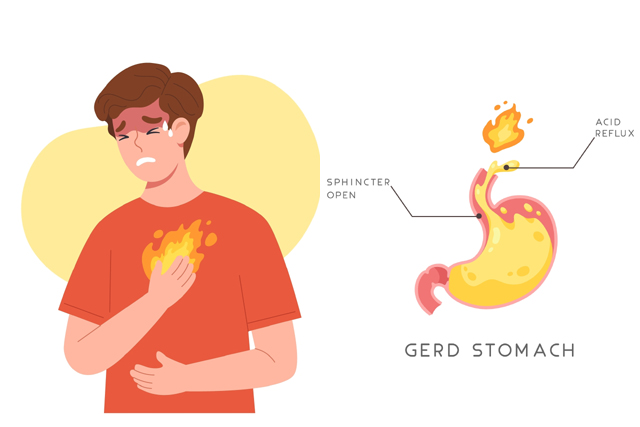
By David Lee, L.Ac.
East Asian herbal medicine offers solutions for many digestive problems, addressing the symptoms and root causes. It has the potential to heal underlying issues, including reversing conditions like Barrett’s esophagus, a pre-cancerous disorder affecting the area between the throat and stomach (the esophagus).
Barrett’s esophagus often develops after long-term gastroesophageal reflux disease (GERD), a condition where stomach acid frequently flows back into the esophagus, irritating. Most individuals with Barrett’s esophagus have experienced GERD for over a decade. Repeated exposure to acid leads to chronic damage to its lining and increases the risk of developing esophageal cancer. In the U.S., about 5.6% of adults are estimated to have Barrett’s esophagus, and it occurs in 10 ~ 20% of GERD patients. Men are two to three times more likely than women to develop it.
Common signs and symptoms of GERD and Barrett’s esophagus include heartburn, sore throat, regurgitation of stomach contents, difficulty swallowing and chest pain.
Case study:
Five years ago, Cynthia, a 54-year-old patient, was taking prescription medication for chronic GERD and irritable bowel syndrome. A recent endoscopy showed significant erosion of her esophageal lining. I prescribed her Wu Zhu Yu Fu Zi Li Zhong Tang, an herbal formula she took in small daily doses over three months.
This formula was chosen based on her constitutional diagnosis as a Soeumin—a body type characterized by a cold constitution that responds well to warming herbs. Wu Zhu Yu Fu Zi Li Zhong Tang is known for reversing ulceration in the digestive lining, making it an appropriate treatment in her case.
Psychologically, Cynthia is Conscientious according to the DiSC model (Driving, Influencing, Steady, and Conscientious), ISFJ (Introverted, Sensing, Feeling, and Judging) in the Myers-Briggs Type Indicator, and Kapha (Pitta, Vata, and Kapha) in Ayurvedic medicine.
Physiologically, she is highly sensitive to caffeine and intolerant to gluten.
It is crucial to note that this formula is unsuitable for warm body types Soyangin and Taeeumin. It can have adverse effects such as fatigue, fever, irritability, inflammation, pain, and digestive dysfunction. In such cases, the formula may fail to improve digestive health or exacerbate existing conditions.
In Cynthia’s follow-up endoscopy, Barrett’s esophagus had resolved, confirming the effectiveness of the treatment.
Since then, whenever Cynthia experienced irritable bowel syndrome with abdominal bloating, Xiang Sha Yang Wei Tang provided effective relief.
By addressing each issue as it arose, Cynthia could experience lasting relief through true healing. Even Barrett’s esophagus has remained in remission, according to endoscopy.
|
Wu Zhu Yu Fu Zi Li Zhong Tang 오수유부자이중탕(吳茱萸附子理中湯) |
Xiang Sha Yang Wei Tang 향사양위탕 (香砂養胃湯) |
|
Ren Shen, Bai Zhu, Gan Jiang, Guan Gui, Bai Shao Yao, Chen Pi, Zhi Gan Cao, Wu Zhu Yu, Xiao Hui Xiang, Bu Gu Zi, Fu Zi. |
Ren Shen, Bai Zhu, Zhi Gan Cao, Ban Xia, Xiang Fu, Chen Pi, Gan Jiang, Shan Zha, Sha Ren, Bai Dou Kou, Sheng Jiang, Da Zao. |































